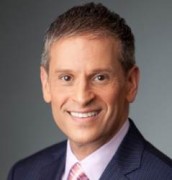In a new series of columns, each week an alum of USC Annenberg will share stories of their time at the school, discuss their career, and offer advice to students.
“Do you miss being on TV?”
That is, by far, the question I am asked most often by clients, friends, family and former co-workers. My answer is always, “Yes and no.”
Yes, I miss being on TV, the adrenaline rush that comes from breaking stock-moving news (my former CNBC colleagues reminisce about my mad dashes down the stairs to the flashcam on the assignment desk when one of the companies I covered unveiled big data, or an FDA advisory committee took a crucial vote, or a stock was being halted for trading due to pending M&A news, etc.) and the ego boost that comes from being “the guy” on my beat, at least in broadcast.
And, no, I don’t miss the rest of it. I’d been toying with the idea of getting out of TV news for a few years before finally taking the plunge at the urging of a few close friends in PR who had grown tired of me talking and waffling about making the move.
My agent, at my request, had negotiated an escape clause that allowed me to leave the business and so, I was able to exit CNBC — albeit with very mixed emotions at the time — mid-contract. But, man, the transition was tough. Changing disciplines is not an easy thing to do.
After having spent 27 years of my adult life in front of a camera, “withdrawing off the TV drug,” as a friend of mine once put it, was much more difficult than I had imagined. I’ve come to the realization I will never lose some of the cravings. And there were a number of substantial challenges I was too naïve to have prepared myself for.
There was a moment early on in my new career when I was ready to throw in the towel and try to boomerang back to CNBC. But my agent encouraged me to soldier on and, besides, I had never quit a job — except when I was an immature busboy at a restaurant in suburban LA. So, I persevered, eventually got my sea legs, felt more comfortable in my own skin, and slowly but surely built a robust portfolio of corporate consulting business.
When I was a student in what was then the USC School of Journalism (now USC Annenberg), journalism majors — myself included — used to look down our noses at the PR majors, even though several of my closest friends and a roommate were among them. “How do you get a degree in PR? Seriously?” It was never in my original career plan to become a PR practitioner, but along with an ever increasing number of former journos who are leaving the business for obvious reasons, here I am: a flak. On the dark side. Every PR cliché. Go ahead and have at it. But I have found the work to be invigorating, inspiring, stimulating, rewarding, fulfilling, challenging and yes, at times, a little overwhelming.
As a former top Wall Street Journal editor — who I counseled to help make a successful transition to PR after I had crossed over — recently put it: “I like helping people. It’s fun.”
So, if you ever find yourself in the same boat, considering switching careers and, in particular, joining an agency versus going in-house at a corporation, here are the four questions I think you should ask yourself:
- Can I do client service? As reporters, it’s the job of PR people to keep us happy. Now, it’s gonna be your job to keep your clients happy. What has served me well from my reporting days is my nature to almost always be turned on and plugged in. It is very hard for me to leave my BlackBerry (yes, I still use one for work) alone for very long.
- Can I generate new business? As reporters, we have to sell story ideas to editors and managers and the finished product to readers, listeners and viewers. But can you sell your services to prospective clients? My style is to let the work speak for itself and to rely on a certain degree of word of mouth, but there is also an element of hustle involved.
- Can I keep track of my time? As reporters, we’re measured by our ability to meet deadlines and the quality of our stories. While your work product in PR must pass muster, you also need to be billable. And that means recording the number of hours, or even fractions of hours, you spend servicing client accounts. It’s harder than you might think, but there are apps for it, which can make it somewhat less burdensome.
- Can I reboot my brand in PR? As reporters, we are expected to build and grow a social media presence. Twitter was a godsend for me at CNBC. However, I struggled to find my new PR voice @MikeHuckman, especially when I was hampered by a very tentative and cautious approach to the micro-blog format. Now, I think I’m in a happy place. Know that it can take time and a lot of trial and error, but it can be done.
The second most common question I get is a follow-up to the first: “Would you go back to TV?” Well, as I just indicated, the thought often crossed my mind when I was still struggling to find my footing. Now that I have, I will take the counsel I give to my clients and “bridge” my way out of that one: “It’s my practice not to speculate on hypothetical what-ifs, but what I can tell you is my new career, after some challenges early on, has turned out to be a great fit.”








